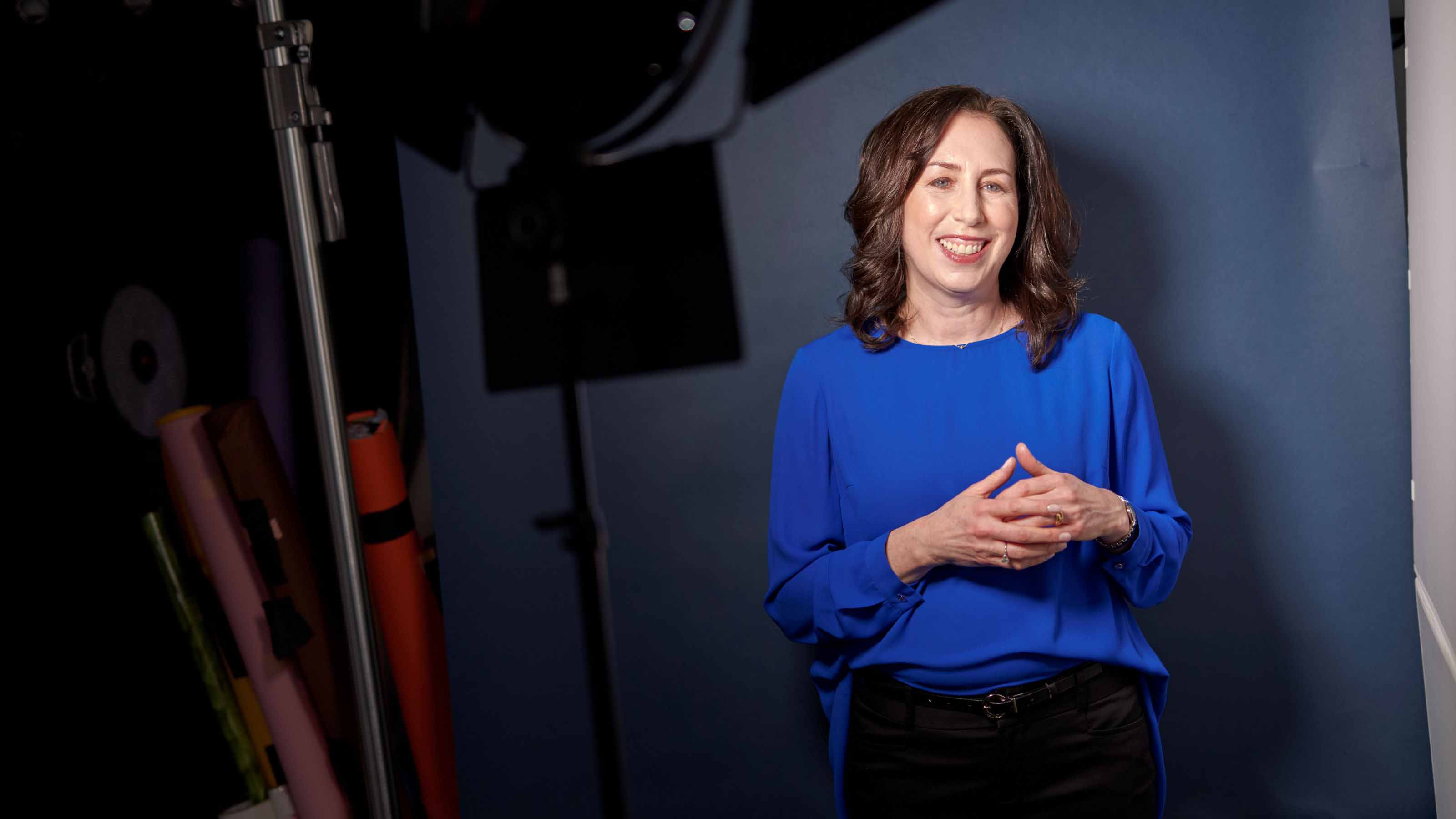Does Your Health Insurance Cover the Coronavirus Test?
Our hosts Sandy Block and Ryan Ermey discuss what your health insurance may or may not cover during the coronavirus pandemic. Also, the pair breaks down market basics to keep in mind amid market volatility and strategies for raising quick cash.

Profit and prosper with the best of Kiplinger's advice on investing, taxes, retirement, personal finance and much more. Delivered daily. Enter your email in the box and click Sign Me Up.
You are now subscribed
Your newsletter sign-up was successful
Want to add more newsletters?

Delivered daily
Kiplinger Today
Profit and prosper with the best of Kiplinger's advice on investing, taxes, retirement, personal finance and much more delivered daily. Smart money moves start here.

Sent five days a week
Kiplinger A Step Ahead
Get practical help to make better financial decisions in your everyday life, from spending to savings on top deals.

Delivered daily
Kiplinger Closing Bell
Get today's biggest financial and investing headlines delivered to your inbox every day the U.S. stock market is open.

Sent twice a week
Kiplinger Adviser Intel
Financial pros across the country share best practices and fresh tactics to preserve and grow your wealth.

Delivered weekly
Kiplinger Tax Tips
Trim your federal and state tax bills with practical tax-planning and tax-cutting strategies.

Sent twice a week
Kiplinger Retirement Tips
Your twice-a-week guide to planning and enjoying a financially secure and richly rewarding retirement

Sent bimonthly.
Kiplinger Adviser Angle
Insights for advisers, wealth managers and other financial professionals.

Sent twice a week
Kiplinger Investing Weekly
Your twice-a-week roundup of promising stocks, funds, companies and industries you should consider, ones you should avoid, and why.

Sent weekly for six weeks
Kiplinger Invest for Retirement
Your step-by-step six-part series on how to invest for retirement, from devising a successful strategy to exactly which investments to choose.
Ryan Ermey: Will insurance cover you if you need coronavirus testing? What about if you need treatment? Sandy tells you what we know so far in our main segment. On today's show, I go over some stock market basics to keep in mind during this bout of extreme market volatility, and we give some options for quick cash if your working situation has changed. That's all ahead on this episode of Your Money's Worth. Stick around.
- Episode Length: 00:24:14
- SUBSCRIBE: Apple Google Play Spotify Overcast RSS
Ryan Ermey: Welcome to Your Money's Worth. I'm Kiplinger's associate editor Ryan Ermey, joined as always by senior editor Sandy Block, and Sandy, where are you recording from?
Sandy Block: You're really not joined with me today Ryan, because I'm in my basement and you are somewhere else.
From just $107.88 $24.99 for Kiplinger Personal Finance
Become a smarter, better informed investor. Subscribe from just $107.88 $24.99, plus get up to 4 Special Issues

Sign up for Kiplinger’s Free Newsletters
Profit and prosper with the best of expert advice on investing, taxes, retirement, personal finance and more - straight to your e-mail.
Profit and prosper with the best of expert advice - straight to your e-mail.
Ryan Ermey: That's right. I'm in my dining room, and there's been either my downstairs or my next door neighbors, I'm in a row house here, have been shaking my walls and floor with some kind of hip-hop sample. They seem to have stopped for a little while. It has been the same sample for the past three hours or so.
Sandy Block: Well, he's consistent.
Ryan Ermey: Yeah. I don't know if he's working on some rhymes or what, I hope they're great. It could be a quarantine magnum opus.
Ryan Ermey: So anyway, we are recording remotely, but we are still here and still bringing you Kiplinger's brand of time-tested personal finance advice. For an opening segment, I wanted to talk a little bit about some market go-to strategies, all-weather strategies and ones that become increasingly important amid the kind of volatility that we've been seeing. The S&P 500 as of today is closed and -- we are recording here on Wednesday -- is down about 29% from the markets high.
Sandy Block: Which is just really scary. Yeah.
Ryan Ermey: It's scary. It's scary, and it's important now more than ever to remember the fundamentals that build wealth over the longterm, which is coincidentally -- or really not so coincidentally -- our cover story for the upcoming May issue of Kiplinger's Personal Finance.
Ryan Ermey: I contributed a couple of things to this that I wanted to highlight here. One is that you can't control what the market does, I mean that is completely evident right now, but one of the things that you can control is cost, and keeping your costs low is a tried and true way of building wealth over time.
Ryan Ermey: The example that I have in the magazine lays this out pretty clearly. So, if you invested, let's say $10,000, in an actively-managed large company, U.S. stock fund, those funds average about 1.04% in annual expense ratios. If you earn 8% on that investment annually, over time you would end up with about $74,000 after 30 years, but you would have, over that same course, paid about $10,000 in fees.
Ryan Ermey: Now, if you point your original $10,000 into say the Vanguard S&P 500 ETF (VOO), which charges just 0.03% in expenses, in a fund that tracks the broad U.S. stock market, you'd end up with about $100,000 having paid only about $365 in fees.
Sandy Block: Right, and there's really no excuse now not to buy low cost investing. It used to be, a lot of times you had to go to a broker to get a good fund, and you'd have to pay like a 5% load, or funds would tack on these huge expense ratios, which were hidden during good times, and then during bad times they become really evident, but now there are just so many options to invest for practically nothing, it's really competitive.
Sandy Block: And I think that's just going to become so much more important moving ahead, because even when this market recovers, we probably aren't going to get the kind of returns that we've gotten used to for quite a while.
Ryan Ermey: Now, a very sort of strategic way to keep costs low is using a strategy called dollar cost averaging, and all that means is that you're investing a fixed amount of money into a group of investments, to the same group of investments, say your 401(k) spread across various mutual funds at fixed intervals.
Ryan Ermey: So every paycheck you're investing $200 into your 401(k), and what that does is guarantee that you're buying low, because if you're investing that same amount of money, you're going to buy more shares when stocks are cheaper, and fewer shares when they're more expensive.
Ryan Ermey: So that's going to drive down your basis over time, and it also sort of takes the emotion out of staying involved in the market.
Sandy Block: Right, you're just putting the money in, going about your business, and not having to sort of hold your breath, and close your eyes and invest at a time when the market is sliding, it's just really everything on autopilot, and so many studies have shown that that's how you end up with more money when you retire than any other way.
Ryan Ermey: Another thing that can sort of take the stress out of investing, especially in a time like this, is to stay broadly diversified, and we've talked about diversifying your investments across stocks and bonds depending on your tolerance for risk, but I'm also talking about maintaining broad diversification across different asset classes that are non-correlated.
Ryan Ermey: What I mean by that is, these are asset classes that perform based on various market conditions that drive these investments. So when one moves in one way, another one might move in a different direction, and a good illustration of why this is important comes to us from the Callan Institute's periodic table of investment returns, which I will link in the show notes, but it shows how a different market indexes behave in different years.
Ryan Ermey: You can see that, for instance, in 2019, large company U.S. stocks led the way, but in 2018 you would have done the best holding cash, and the year before that you would have done the best holding emerging markets.
Ryan Ermey: So the old saying is that there's always a bull market somewhere, if you're broadly diversified, you're positioned to take advantage of the most successful corners of the market, but it also means that when things are sliding, you have some things that are going to give you some ballast, right?
Ryan Ermey: So if one major thing like stocks are sliding, maybe you have something that is holding up better. So, over time, a broadly diversified portfolio in any given year, I should say, in a broadly diversified portfolio is going to lag whatever's going gangbusters, but over time it's going to give you a much smoother return, which is important in periods of market volatility.
Ryan Ermey: The last thing I sort of wanted to mention here, is that markets like this are scary, and if you're not investing yet, I have to urge you to start, even though it's scary, and it's not because I am telling you to time the market, and buy low, and this is the time to get in, we're likely looking at a lot of volatility going forward, but the key to longterm investing success is letting time and compounding interest do their work.
Ryan Ermey: I'm not going to give you a whole bunch of other numbers, I am going to have an example in that cover story that I mentioned, but suffice to say, if you start investing as a 21-year-old, and the example that I use is investing $100 a month, which is pretty modest, and earn a certain return, by the age of 67 you're going to have a certain amount of money, and had you waited until you were 30, maybe people think, "Oh, when things are a little bit more financially stable, when I can afford it," whatever, investing the same amount of money, you would have about half of that amount.
Ryan Ermey: So you really need to start early, and this is when you talk about closing your eyes, holding your nose, whatever, but as long as you are staying diversified, investing at regular intervals, and keeping your cost low, starting early is the best thing that you can do for the longterm success of your portfolio.
Sandy Block: Even if it's just a little bit of money, it makes a big difference over time.
Ryan Ermey: That's exactly right. After the break, everything we know so far in terms of what your insurance will and won't cover during the outbreak, don't go anywhere.
Ryan Ermey: We are back, and for our main segment we want to talk about something that is surely on everyone's mind during this pandemic, and that concerns your health insurance. So Sandy, will my health insurance cover coronavirus?
Sandy Block: Well, the reason I wanted to talk about this today Ryan, is because we're hearing a lot about how different counties and cities are ramping up coronavirus testing, and obviously that's a big key to getting this under control, is finding out how many people have it.
Sandy Block: Now, before I go any further, I want to say that as we speak, on Wednesday Congress is... Senate just passed a big stimulus bill, there's a lot of stuff going on on Capitol Hill that could affect some of these things, because part of the stimulus I think and the economic assistance is going to include some health care.
Sandy Block: So this is a rapidly changing topic that we will certainly return to, and we can also refer to in our show notes, and we'll be on kiplinger.com, but the thing I wanted to talk about is testing. A lot of people want to be tested, or afraid they might have symptoms, maybe they've been in contact with someone who has symptoms, and they wonder, "If I get tested, how much is it going to cost?"
Ryan Ermey: Right.
Sandy Block: Well, the good news is that most big insurance companies have said they won't charge you a copayment, or other costs to get tested for the coronavirus. Although, you can't just walk up to a hospital, or I think in Maryland they're going to start turning inspection stations into testing sites, you can't just drive up by yourself because you feel bad, you have to have a note from your doctor for your insurance to cover it.
Sandy Block: And they probably want to test you anyway if you don't have that, but if you've got an order from your doctor, it's very likely that your insurance company will cover the cost of testing, you won't even be charged a copay, and I think soon the legislation that's pending will make that mandatory.
Sandy Block: So if you have private health insurance, getting the test should not cost you anything, likewise if you're on Medicare, Medicare part B will cover the cost of testing as long, again, as you have an order from your doctor.
Sandy Block: Now, treatment is another matter. Some people have gotten very sick, and even though there's some confusion about this, I think certain people in high places have said that health insurance will cover testing and treatment -- and health insurers have said, "No, not necessarily."
Sandy Block: Now, most insurance policies do cover hospitalization, but as we know, as more and more of us have more and more out-of-pocket costs, you could be on a hook for a portion of those costs depending on your policy -- and those costs could be substantial.
Sandy Block: I saw one study that estimates the cost of treating someone with coronavirus who requires hospitalization could range between 10,000 and 20,000. Now, a note about high deductible plans, which I believe you have and I have and many people...
Ryan Ermey: I sure do.
Sandy Block: ...the IRS issued a notice earlier this month that said insurance plans with high deductibles can eliminate the deductible for testing and treatment of coronavirus without risking their tax status.
Sandy Block: This doesn't necessarily mean they're going to do that, but if you do have to be treated for coronavirus, we already know that you're not going to pay for the testing, if you have to be treated, at the very least, it may not count towards your deductible, which ultimately could reduce the amount that you pay.
Sandy Block: The last thing I want to say, well two things I want to say is, one, stay tuned because I think a big part of the legislation that is being addressed right now, that is being discussed right now is how to help people pay for testing and treatment, particularly the large portion of Americans who don't have any insurance at all...
Ryan Ermey: Right.
Sandy Block: ...what happens to them. We certainly don't want to discourage people from getting tested and treated if they have this communicable disease.
Sandy Block: So, as I said, this is a working story where there's going to be a lot more on it as we move forward, but certainly given the high cost of this, if you are hospitalized or do need treatment, it just more and more points to you doing what we're doing right now, which is working from our basements and dining rooms and doing good practices. Washing your hands, social distance and all those good things, because it could get quite expensive, even if you have insurance, if you really do get sick.
Ryan Ermey: All right, we will be tracking this story as close as we can, bringing any and all updates your way -- and Sandy thank you for being so on top of it so far.
Sandy Block: As I said, it's a work in progress Ryan.
Ryan Ermey: Coming up, we give you options for quick cash on hand if your income has been affected by the quarantine.
Ryan Ermey: We are back, and before we go, and I did tell the listeners last episode that not every episode would be the corona-hour, but we're still early days here folks. There's a lot of things to consider here, and one of the things is that a ton of people are seeing their work life changing drastically, and you and I Sandy are lucky enough to work in a profession that we can work from home, and we're not totally affected by this.
Ryan Ermey: I mean, obviously you're in a basement, I'm in a dining room listening to hip-hop secondhand, but a lot of people aren't so lucky to be in this kind of situation. They're either losing their jobs or having their hours reduced pretty significantly. So, obviously there's a major question about the economic toll that this quarantine is going to take on a lot of households, and I have a question about how people can have some liquidity.
Sandy Block: Right, and again, as we're recording this Congress is working on legislation, they want to send checks out to people really fast, so we all...
Ryan Ermey: Yeah, great -- a grand for everyone, right?
Sandy Block: Yeah. Well, the numbers keep moving around, and whether it's going to be income-based or whatever, but they're very eager to get checks out, and the reason they want to do that is because people are losing their jobs.
Sandy Block: Ryan, I know you've worked in the restaurant business, so have I, and those people are getting hit hard -- and there have just been many news reports in the last few days of people who have just suddenly been told, "You're not wanted, you're not needed here anymore, we're closing down."
Sandy Block: We know many, many Americans live paycheck-to-paycheck and have little or no money in an emergency fund. So this can create a real crisis even if the checks come out in two weeks, that could be too late for some people.
Sandy Block: So I just wanted to tick off, and we'll do a lot more on this in the future, because it's something we can really dig into, but I just wanted to throw out a few ideas right now, if you need cash, you need to pay the rent or whatever.
Sandy Block: I mean, hopefully you have an emergency fund, but let's assume that you don't, let's start...
Ryan Ermey: Honestly, so many people don't.
Sandy Block: So many people don't.
Ryan Ermey: It's like best practice, but it's just not reality for a lot of people.
Sandy Block: So let's start if you have a house, if you have a home, a home equity line of credit is a great way to raise a low interest cash. Now, I will add a caveat that right now everybody in the world is trying to refinance, because interest rates are really low. So you might have trouble getting somebody on the phone, but if you already have a home equity line of credit, that is a great source of money. If you don't have one... now is going to be hard to get one if you've lost your job, but if you're still working and worried about losing your job, go get one of these, because that's interest rates are much, much lower than they are on credit cards.
Sandy Block: A lot of people are sitting on a lot of home equity right now, because housing prices have been going up so much. So that would be my first, and now obviously somebody who's working at a coffee shop probably and renting, that's not going to be an option for them. Another one that I would suggest is that you can always withdraw contributions from your Roth IRA without paying taxes or penalties.
Sandy Block: Now, the problem with that is you're going to be taking money out at a time when your Roth IRA is probably pretty beat up, so I'd be judicious about this, but it is a source of emergency money. So in the story that I wrote for the May issue, that's one of the reasons we recommend a Roth, because you always have this flexibility to tap the amount that you put in.
Sandy Block: So if you put $3,000 in a Roth, and it's worth $5,000 you can take up to $3,000 no penalty, no tax. So that's another sort of...
Ryan Ermey: You have to leave your earnings in there.
Sandy Block: Your earnings are taxed, but the amount that you contributed is not. So that's another one. The third one I'll mention is if you're working and you have a 401(k), you can borrow from your 401(k).
Sandy Block: Again, you're taking money out in an inopportune time, but it's certainly far better than cashing out a 401(k), which will certainly trigger taxes and penalties that you'll never recover.
Sandy Block: You can take a loan from your 401(k). Almost all companies offer them and the interest rate is around 5%, so you can pay it off over time. I mean, I wouldn't do this, no one's taking vacations right now, but I wouldn't do this frivolously -- but if it's a matter of losing your home or not being able to put food on the table, this is certainly something to look into.
Sandy Block: The last thing I'll say, and again, this is something we're going to explore going forward, I think you're going to have a lot more leverage negotiating with credit card companies, with your lender, your mortgage lender. I think there's going to be a lot of pressure on financial institutions to give people a break, because a lot of people who can't pay their bills, it's not their fault, we're in a crisis and I think, you know, don't throw up your hands, don't try not to call.
Sandy Block: We'll talk about this more, because I think this is a developing story, but that's just something else to keep in mind if you're in a cash crunch, that things are negotiable right now.
Ryan Ermey: Yeah. Now, I was going to say the same thing about that. Things are probably going to get stricter with landlords, as well. It's probably going to be quite a bit more difficult to evict you under these circumstances. So these are all things that we're going to be keeping an eye on, and I also wanted to note before we sign off here, that we asked last show if anyone had any questions to please send them our way. We have had one or two. We are working on tracking down the answers, but like I said last week, this pandemic is bringing up all sorts of unique financial situations that we maybe haven't even considered yet, that you may be on the cusp of something that's happening to a lot of people.
Ryan Ermey: So we are interested in knowing your stories, your dilemmas and your questions. We are going to try to answer them on the show, we're going to ask a lot of smart people if they know the answers -- I mean certainly in the case that I don't know the answer. So keep sending questions in to podcast@kiplinger.com, ryan_ermey@kiplinger.com, sandra_block@kiplinger.com. We are going to try to get everything answered for you; in the meantime, hope you're downloading and listening to the show and enjoying it -- and stay healthy out there folks.
Ryan Ermey: That'll do it for this episode of Your Money's Worth. For show notes, more great Kiplinger content and the topics we discussed on today's show, visit Kiplinger.com/links/podcast. You can stay connected with us on Twitter, Facebook or by emailing us at podcast@kiplinger.com, and if you like the show, please remember to rate, review and subscribe to Your Money's Worth wherever you get your podcast, thanks for listening.
Links and resources mentioned in this episode
- Start Investing Now? Uh, Yeah
- The Callen Periodic Table
- How to Cut Your Investment Fees in Half
- KFF.org: Private Health Coverage of COVID-19
- Medicare.gov: Medicare and the Coronavirus
- What to Do If You Lose Your Health Insurance
- 15 Safe Ways to Earn Extra Cash in the Age of the Coronavirus
- 10 Coronavirus Stimulus Measures That Could Help You in 2020
Profit and prosper with the best of Kiplinger's advice on investing, taxes, retirement, personal finance and much more. Delivered daily. Enter your email in the box and click Sign Me Up.

Block joined Kiplinger in June 2012 from USA Today, where she was a reporter and personal finance columnist for more than 15 years. Prior to that, she worked for the Akron Beacon-Journal and Dow Jones Newswires. In 1993, she was a Knight-Bagehot fellow in economics and business journalism at the Columbia University Graduate School of Journalism. She has a BA in communications from Bethany College in Bethany, W.Va.
-
 Ask the Tax Editor: Federal Income Tax Deductions
Ask the Tax Editor: Federal Income Tax DeductionsAsk the Editor In this week's Ask the Editor Q&A, Joy Taylor answers questions on federal income tax deductions
-
 States With No-Fault Car Insurance Laws (and How No-Fault Car Insurance Works)
States With No-Fault Car Insurance Laws (and How No-Fault Car Insurance Works)A breakdown of the confusing rules around no-fault car insurance in every state where it exists.
-
 7 Frugal Habits to Keep Even When You're Rich
7 Frugal Habits to Keep Even When You're RichSome frugal habits are worth it, no matter what tax bracket you're in.
-
 PODCAST: Tax Breaks for College Finance with Kalman Chany
PODCAST: Tax Breaks for College Finance with Kalman ChanyPaying for College Paying for (ever-pricier) college is a challenge that this consultant meets head on with highly specific guidance.
-
 PODCAST: Car-Buying in an Inflated Market with Jenni Newman
PODCAST: Car-Buying in an Inflated Market with Jenni NewmanBuying & Leasing a Car With cars both scarce and expensive these days, what to do if you want – or need – a new ride? Car-buying strategist Jenni Newman of Cars.com shares some tips. Also, more on the magical 9% savings bond.
-
 PODCAST: How to Find a Job After Graduation, with Beth Hendler-Grunt
PODCAST: How to Find a Job After Graduation, with Beth Hendler-GruntStarting Out: New Grads and Young Professionals Today’s successful job applicants need to know how to ace the virtual interview and be prepared to do good old-fashioned research and networking. Also, gas prices are high, but try a little global perspective.
-
 PODCAST: Is a Recession Coming?
PODCAST: Is a Recession Coming?Smart Buying With a lot of recession talk out there, we might just talk ourselves into one. We take that risk with Jim Patterson of The Kiplinger Letter. Also, dollar stores: deal or no deal?
-
 PODCAST: This Couple Tackles Love and Money as a Team
PODCAST: This Couple Tackles Love and Money as a TeamGetting Married Fyooz Financial, the husband and wife team of Dan and Natalie Slagle, have carved out a niche advising other couples with the money questions that come with pairing up. Also, where is this troubled stock market headed?
-
 COVID’s Financial Toll Isn’t What You Think
COVID’s Financial Toll Isn’t What You ThinkCoronavirus and Your Money From a grandma’s retirement in ruins to a troubled teen inheriting too soon, COVID’s effects will last for generations. While nothing can prepare you for the pain of losing someone you love, a financial planner explains how preparation can lessen the financial devastation.
-
 PODCAST: Which Documents to Keep, Which to Shred and Which to Scan
PODCAST: Which Documents to Keep, Which to Shred and Which to Scanhome insurance A speedy recovery from disaster can depend on your recordkeeping. Kiplinger’s Personal Finance writer Rivan Stinson tells us how to get our papers in order.
-
 PODCAST: High Gas Prices with The Kiplinger Letter’s Jim Patterson
PODCAST: High Gas Prices with The Kiplinger Letter’s Jim Pattersoncars Why are we paying so much more at the pump? How long will it last? What can you do? Plus: Congress is making changes to retirement-savings rules again.

